Shutter Island Review (original) (raw)
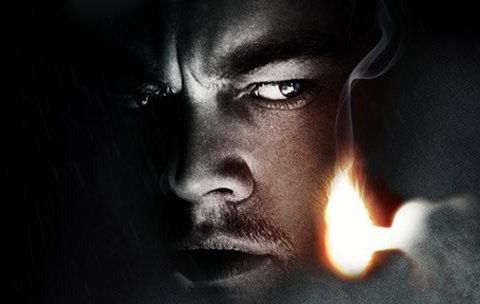
Screen Rant's Kofi Outlaw reviews Shutter Island
This is one of those reviews where I feel totally chained by the NO SPOILER rule. After all, it's almost impossible to talk about Martin Scorsese's Shutter Island without discussing the film in its entirety. Shutter Island isn't one of those simple "love it" or "hate it" movie experiences - this is one of those films that makes you go, "Hmmmm..."
Leonardo DiCaprio stars as Federal Marshal Teddy Daniels, a hard-ass cop who gets called out to a remote psychiatric ward off the New England shore (I'll let you guess the name of the island). It's a facility where dangerous maniacs are subjected to unique "treatments" by the questionable Dr. Cawley (Ben Kingsley) and his loyal staff of physicians, nurses and heavily armed corrections officers.
Teddy arrives on Shutter Island (seasick no less) with his new partner Chuck (Mark Ruffalo), determined to get to the bottom of a case involving a female inmate named Rachel Solando, who vanished from her cell without a trace. Rachel is unstable and dangerous: she was sent to the Island after murdering her three children and arranging them around the dinner table for her husband to find.
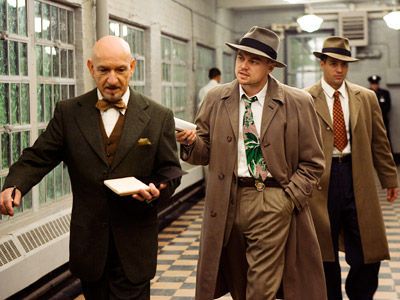
Ben Kingsley and Leo DiCaprio in a scene from 'Shutter Island'
Teddy and Chuck start asking questions, but they don't get answers. Nobody on the island seems to want to talk - not the staff, not the patients, and certainly not Dr. Cawley and his cunning partner, Dr. Naehring (the brilliant Max von Sydow). Certain staff are conveniently "on vacation," when the Marshals arrive to talk with them, important records are being kept confidential, and Teddy and Chuck - two WWII vets who know the face of true evil - soon begin to wonder about the mess they've stumbled into.
As the two Marshals dig deeper, Teddy begins to come apart; He starts having crazy dreams soon after Dr. Cawley feeds him some "Aspirin," and those dreams soon turn into waking hallucinations of his dead wife Dolores (Michelle Williams), who was killed in an arson fire a few years back. As his mind starts slipping, Teddy realizes that Dr. Cawley and his island may be a trap he has foolishly stumbled into. Trusting no one but his partner and himself, Teddy sets off to kick down the locked doors of the Island and discover the truth.
Shutter Island is based on the novel of the same name by author Dennis Lehane, who is best known for his Boston area mystery/dramas, Mystic River and Gone Baby Gone. Unlike those other two books, however, Shutter Island is a psychological drama that is far deeper and more complex. The clear challenge facing screenwriter Laeta Kalogridis was how to take all the psychological components of the story and balance them with the pulp mystery narrative that most viewers are expecting.
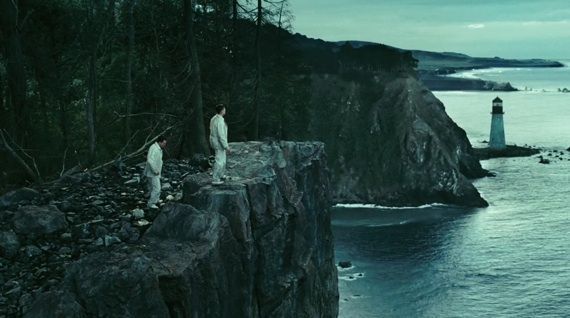
While the script managed to strike a good balance on paper, I don't think Scorsese was that fortunate in translating it to the screen. First, let me say that Shutter Island is one of the most visually rich Scorsese films that I've seen since Raging Bull. The photography and cinematography are simply gorgeous and the dream/hallucinations sequences (which can be so lame when executed poorly) are some of the most striking I've seen in awhile. There are also plenty of Easter-egg references to pulpy B-movies of the past - a nice bit of extra for fans familiar with the genre.
However, Shutter Island definitely stumbles in the editing department. The transitions between "the real" and "the surreal" are clunky and often awkward, especially as the mystery unwinds in the second and third acts. The nature of the story and the heavy psychological components also affect the pacing; even though the writer and director never lose sight of where they're going, the film itself will ultimately feel that way to a first-time viewer. It's a necessary evil though, and I don't really see how the filmmakers could've done it any other way. It's a hard story to tell on film.
The actors faced similar challenges. DiCaprio, Kingsley and Ruffalo in particular had a tough time of it, faced with the task of turning in multi-layered performances of depths they probably weren't expecting until they actually got on set and started filming. The entire ensemble pulls through pretty well (DiCaprio does some heavy lifting performance-wise) - although I definitely need to see the film again, knowing how it ends, and watch the performances with a closer eye.
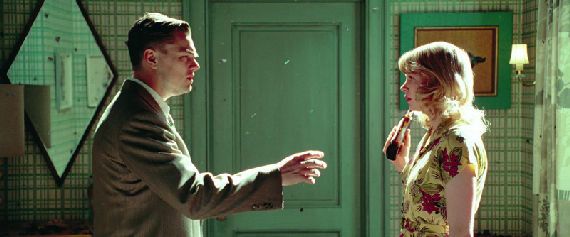
There are some great cameos, including an appearance by Ted "Buffalo Bill" Levine as Shutter Island's violent warden; Jackie Earle Haley as a distraught inmate; and Patricia Clarkson even shows up for a brief moment as a mysterious woman living on the island. Michelle Williams probably turns in the best performance of all as Teddy's murdered wife, even though she only appears in the most surreal moments of the movie.
Ultimately Shutter Island is an interesting departure for Scorsese. And while the end result isn't perfect, the fact that the film was crafted by one of cinema's greatest directors elevates it far above the hokey B-movie-with-a-twist that it could've been. Personally speaking, I'm one of those movie lovers who appreciates a film that makes me want to watch it again as soon as the end credits have rolled - and Shutter Island is definitely that. I'm already looking forward to my second visit.
If you want to talk about the film in detail without worrying about spoiling it for people who haven't seen it, head over to our Shutter Island spoilers discussion.
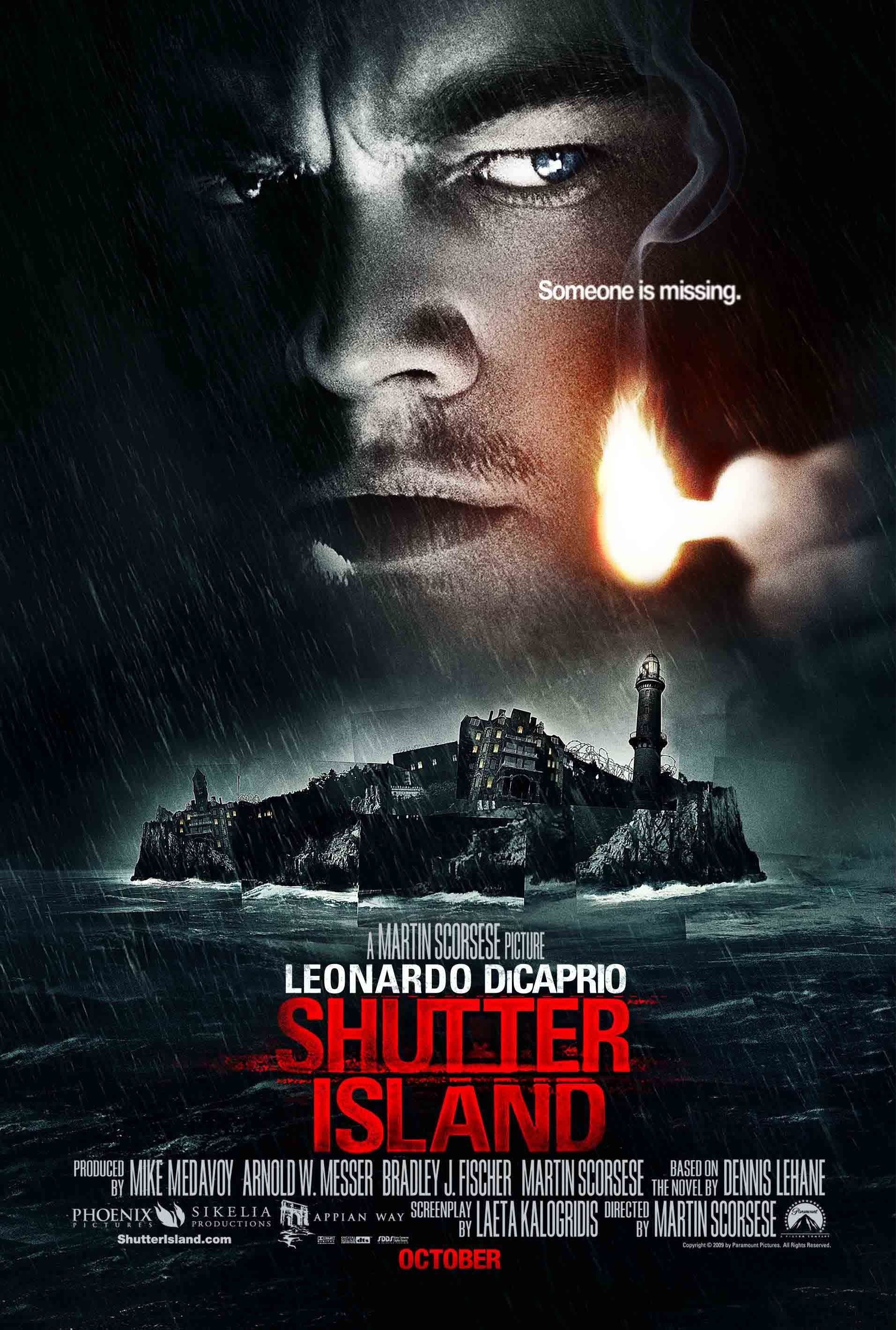
Martin Scorsese's Shutter Island is based on the novel of the same name by Dennis Lehane and stars Leonardo DiCaprio, Mark Ruffalo, and Ben Kingsley. Set in 1959, Shutter Island follows two U.S. Marshalls - Teddy Daniels (DiCaprio) and Chuck Aule (Ruffalo) as they are sent to investigate the disappearance of a patient from a hospital specializing in psychiatric care.